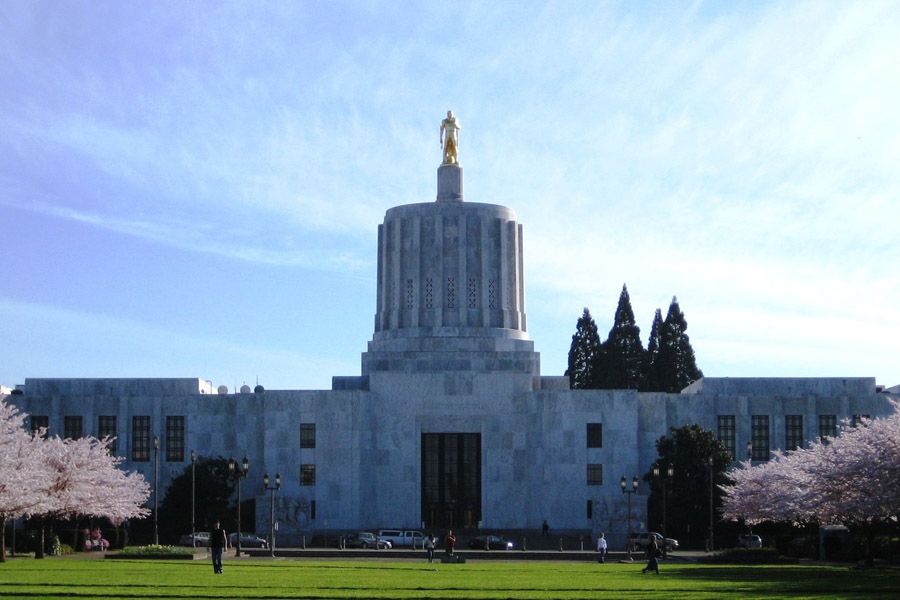The Oregon Legislature kicks off a 35-day session this week. Here’s what OB is watching.
The Oregon Legislature kicks off its 2022 session Tuesday. It’s a short session, which — per the state Constitution — must adjourn after 35 days.
This month’s session marks Kate Brown’s last as governor and Peter Courtney’s last session as Senate President. (Brown cannot be reelected due to term limits; Courtney, the state’s longest-serving legislator, is retiring after 36 years.) It will be Rep. Dan Rayfield’s (D-Corvallis) first as House Speaker, as Rep. Tina Kotek (D-Portland) resigned earlier this month to focus on the governor’s race.
Sen. Tim Knopp (R-Bend) will serve as the Senate’s newly elected minority leader, and Rep. Vikki Breese-Iverson (R-Prineville) will serve as House minority leader.
The Capitol will be open for this year’s session and the public is welcome. But visitors will be subject to new security measures — including bag searches and metal detectors — announced earlier this month. State officials adopted the new measures in response to a 2020 security breach that led to multiple arrests as well as the expulsion of former Rep. Mike Nearman after video surfaced showing he escorted protesters into the building.
Legislators could read as many as 200 bills this year. What follows is a nonexhaustive list of bills we’ll be watching this session:
Agriculture
Farmworker overtime. House Bill 4002, introduced by Rep. Andrea Salinas (D-Lake Oswego), would prohibit employers from requiring agricultural workers to work overtime unless they offer overtime compensation. The Oregon Court of Appeals is also considering a legal challenge to state regulations that prohibit farmworkers from receiving overtime compensation.
Education
Coding for kids. Senate Bill 1590 would direct the Oregon Department of Education to develop a statewide, long-term strategic plan to provide computer-science education opportunities for every public school student in the state.
Energy and the Environment
Carbon sequestration. SB 1534 would establish a state policy to increase carbon sequestration “in natural and working lands and waters.”
Thinning charred forests. SB 1573, filed by Sen. Knopp, would direct $50 million to the State Forestry Department to fund increased forest-thinning operations in specified wildfire-prone counties.
Health Care
Birth rights. HB 4134 would require insurers to cover labor and delivery services for patients who give birth at an out-of-network facility — provided the change of facility is related to a public health emergency.
Parity for naturopaths. HB 4006 would require insurers to reimburse naturopathic physicians for services provided by traditional doctors.
Clearing (and cooling) the air. SB 1536 would limit restrictions on portable cooling devices by landlords, homeowners associations and local governments, and HB 4058 would require the Oregon Health Authority to create a program to acquire and distribute air conditioners and air purifiers on an emergency basis to those eligible for medical assistance. (The state Senate actually passed a bill allowing the Oregon Health Plan to pay for air conditioners for vulnerable patients in 2013. The vast majority of individuals who died during last summer’s record-shattering heat wave did not have air conditioning or fans.)
Housing and Land Use
An outgrowth. HB 4118, introduced by Rep. Jack Zika (R-Redmond), would allow cities to expand their urban-growth boundary — or to require Oregon Metro to expand the urban-growth boundary — to include “land designated as urban reserve that supports workforce housing and commercial development supportive of workforce housing if certain conditions are met.”
Affordable housing. HB 4043, introduced by Rep. John Lively (D-Springfield), would create a credit against income taxes for those who purchase publicly supported housing to retain as affordable housing. HB 4065 would allow certain cities to “adopt unique requirements and incentives for inclusion of affordable housing within certain housing developments.”
Jobs and Labor
Workforce development. Earlier this month Gov. Brown announced a sweeping workforce development plan with a potential price tag of $200 million at two committee meetings earlier in January; SB 1545, filed at the governor’s request, would establish a set of grant programs in the Higher Education Coordinating Commission to provide workforce development in construction, health care and manufacturing.
The docket includes a second ambitious workforce development bill. HB 4014, introduced by Rep. Jeff Reardon (D-Happy Valley), would establish a program Reardon is calling the “Prosperity 10,000 Program,” which would provide career coaching, occupational training and job-placement services for at least 10,000 low-income job seekers.
Finally, essential workers could get more than a thank you. HB 4001 would direct the state’s Department of Administrative Services to study a potential program to make payments to essential workers for services performed during the pandemic.
Liquor, Cannabis and Gaming
Pruning the cannabis industry. HB 4016 would allow the Oregon Liquor and Cannabis Commission to refuse to grant new marijuana-production licenses when necessary based on supply and demand.
Pot taxes. SB 1506 would increase the maximum tax or fee that a city or county could impose on the sale of marijuana. (A bill that would have permitted cities to increase marijuana sales tax from 3% to 10% passed out of the Senate last year but was stuck in committee when the Legislature adjourned.)
And lastly, the Beaver State could get a cut of your wager in the Beavers-Ducks game. SB 1503, introduced by Sen. Courtney, would allow the Oregon State Lottery to run games based on college-sports betting.




